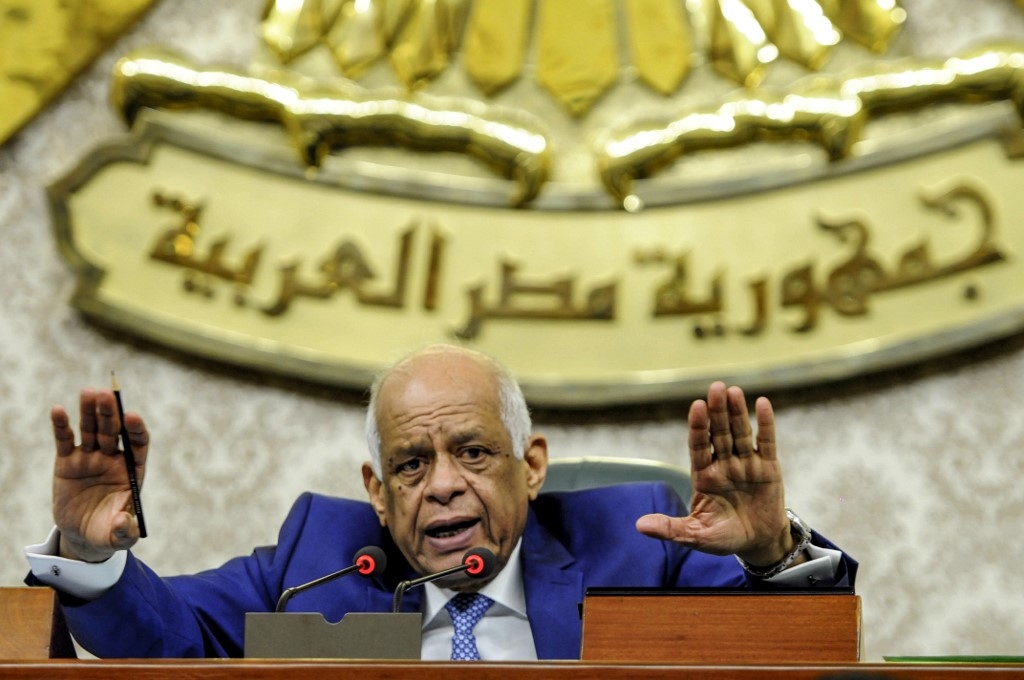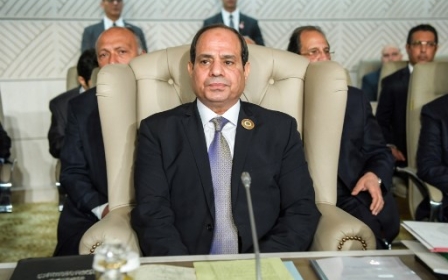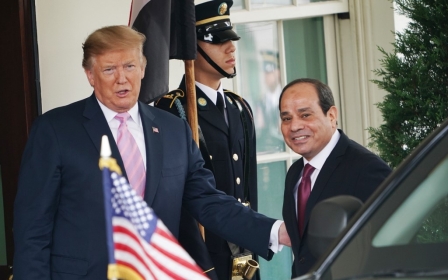'A medieval dictatorship': Egypt’s parliament votes to extend Sisi's rule until 2030

The Egyptian parliament has voted in favour of a number of constitutional amendments that would extend the rule of president Abdel Fattah el-Sisi until 2030.
The 596-member parliament is dominated by Sisi supporters.
Tuesday’s vote paves the way for a referendum to be held within the next 30 days in accordance with Egypt's 2014 constitution.
Lawmakers approved with a two-thirds majority amending article 140 of the 2014 constitution to extend the presidential term to six years instead of four.
They also voted in favour of article 241 that would allow Sisi to run for another term in 2024.
Meanwhile, Egypt has blocked more than 34,000 internet websites in an attempt to restrict the opposition Void campaign (referring to their view that the government's legitimacy is "void") that has been launched to rally Egyptians against the amendments, which activists and rights groups say would further enshrine military rule in the country.
The Void campaign has collected more than 250,000 signatures and has established five new websites in an attempt to counter the ban.
In Paris today, a number of Egyptian human rights advocates organised a press conference to declare their opposition to the amendments.
During the conference, hosted by the Human Rights League, actor and activist Amr Waked reiterated his opposition to the amendments and dismissed them as “a return to medieval dictatorship”.
He denounced western support for the Sisi government, particularly continued arms sales from foreign states.
“Why are you giving the dictatorship legitimacy? Why are you selling arms to it?” he said, addressing the international community.
“Have you turned into arms dealers?”
Waked, who is living in exile in Europe, took aim at Western government’s approach to the Sisi rule on the basis of safeguarding Egypt’s stability.
“The security situation in Egypt is a disaster since this regime came to power and terrorism is on the rise,” he said.
But he insisted that Egyptians will “liberate themselves” and that those who supported Sisi will pay a price “higher than their investments in keeping him in power”.
Another actor, Khaled Abol Naga, participated in the Paris conference, and said that Tuesday was "a sad day for Egypt".
Using the slogan of the Void campaign, he warned that the outcome of the referendum is “void” and so are any agreements that France would sign with it.
Both secular and Islamist movements have issued statements on Tuesday rejecting the amendments.
The Muslim Brotherhood described the amendments as “a new coup”, in reference to the military coup led by Sisi against his predecessor Mohamed Morsi who hailed from the Brotherhood.
An alliance of secular parties called the Civil Democratic Movement called on Egyptians to take part in the referendum by voting “No” as a means of “resistance”.
Updated amendments
The amendments approved on Tuesday included provisions updated from previous drafts that proposed two more six-year terms for Sisi.
The new amendments would allow Sisi to stay for two more years after his four-year term ends in 2022. Then he would be allowed to run for a six-year term, ending in 2030.
The change, according to parliament speaker Ali Abdel Aal, was the outcome of dialogue sessions that had been in place over the past two months.
Abdel Aal, however, added that a new constitution should be drafted within the next decade - signalling that Sisi may have another chance to extend his term beyond 2030.
“We need a new constitution; there is no way we will carry on without a brand new constitution within the next 10 years,” Abdelal said.
The state-run Ahram newspaper reported that the referendum would begin on 20 April with expatriates. But an official date has not yet been announced.
Sisi supporters say the amendments are necessary to give him more time to implement his platform, including major development projects and economic reforms.
Sisi is a former minister of defence who came to power in 2013 after leading a coup against his predecessor Mohamed Morsi, Egypt's first freely elected civilian president.
Since his highly contested election in 2014, Sisi has overseen what independent groups have described as the worst crackdown on human rights in Egypt's modern history, with the detention of at least 60,000 political prisoners and a virtual ban on protests.
Middle East Eye propose une couverture et une analyse indépendantes et incomparables du Moyen-Orient, de l’Afrique du Nord et d’autres régions du monde. Pour en savoir plus sur la reprise de ce contenu et les frais qui s’appliquent, veuillez remplir ce formulaire [en anglais]. Pour en savoir plus sur MEE, cliquez ici [en anglais].




